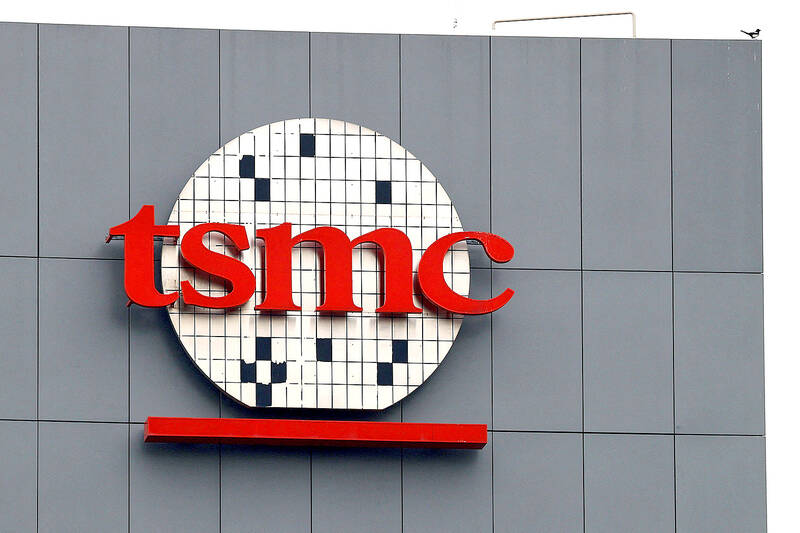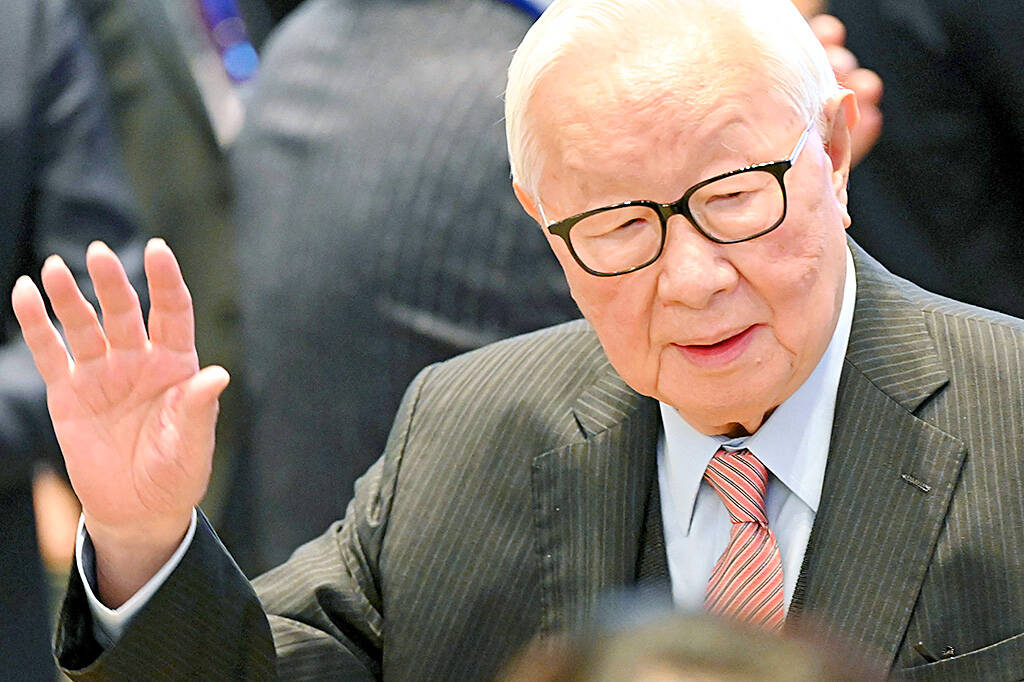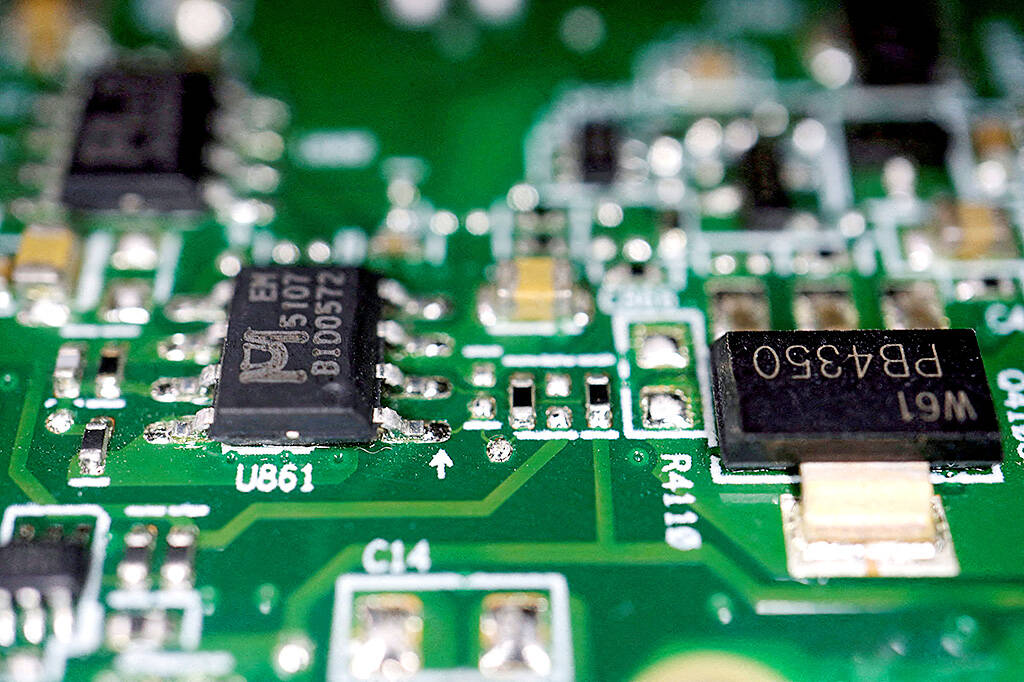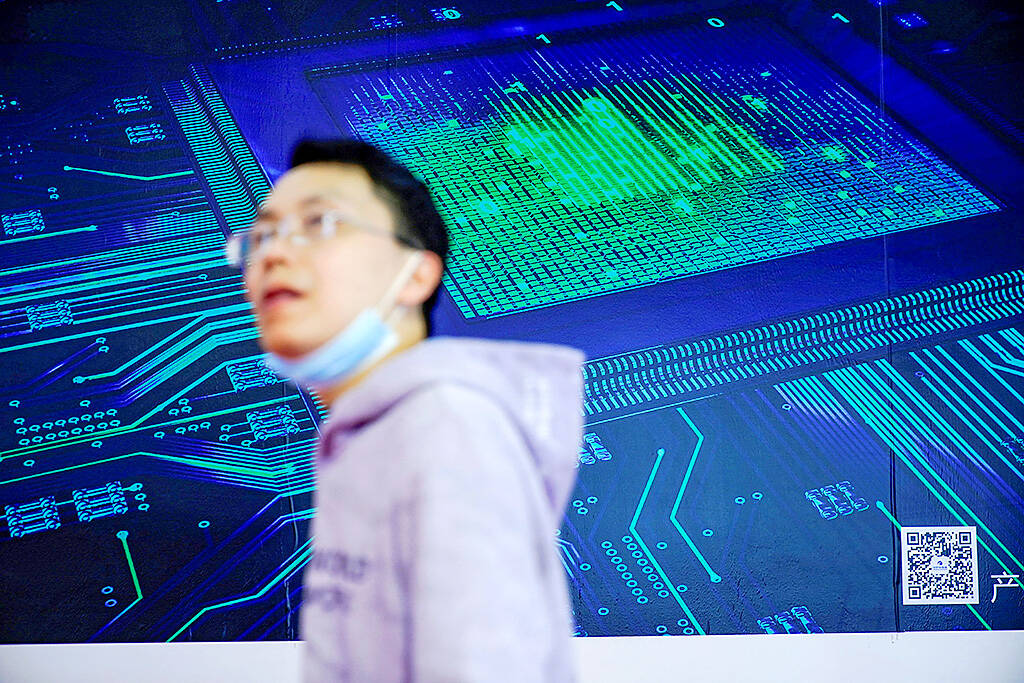Spooked by the threat that China might invade Taiwan, the US wants to cut its dependence on the island’s world-beating microchips. Officials in Taipei believe the Biden administration is going too far.
In quiet conversations and back-channel warnings, Taiwanese officials have urged their American counterparts to tone down their rhetoric about the dangers of relying on chips made by Taiwan Semiconductor Manufacturing Co (TSMC, 台積電).
The officials are particularly unhappy with Commerce Secretary Gina Raimondo, who has called US dependence on Taiwanese chips “untenable” and “unsafe.” They were also uneasy with remarks by a top Republican lawmaker, Michael McCaul, during a recent trip to Taipei. He said Taiwan’s semiconductor industry is a strategic asset that’s “very vulnerable to invasion.”

Photo: Reuters
“The window’s closing,” McCaul said about a US push to move the chips supply chain out of Taiwan. “We don’t have a whole lot of time.”
Taiwan’s concerns were described by people familiar with the government’s stance who asked not to be identified discussing private conversations.
The nervousness they described highlights the conundrum that Taiwanese officials face in maintaining the island’s role as home to 90 percent of the world’s advanced semiconductors, which power everything from smartphones to artificial intelligence chatbots, while also trying to attract the military and diplomatic support needed to deter an invasion.

Photo: AFP
China views Taiwan as its territory and a national security priority. Beijing has watched warily as President Tsai Ing-wen (蔡英文) has the nation is essentially already an independent country, even if few nations recognize it as such, and as President Joe Biden repeatedly said the US would come to Taiwan’s defense if attacked.
“The Taiwan question is the core of the core interests of China,” Chinese Foreign Minister Qin Gang (秦剛) said Friday at the opening of Shanghai’s Lanting Forum.
For Taiwan, the US warnings about the risk of attack have taken on new urgency amid signs that some investors are listening. They include billionaire Warren Buffett, whose Berkshire Hathaway Inc cut its TSMC holdings by 86 percent in the fourth quarter over concern about tensions between China and Taiwan.

Photo: Reuters
“I re-evaluated that part of it,” Buffett said in an interview with CNBC. “I didn’t re-evaluate the business, the management or anything of the sort.”
Pressed on Taiwan’s concerns, a Commerce Department official, who asked not to be identified per agency policy, said the US will continue to work with allies including Taiwan to diversify and strengthen supply chains. That includes through increased investment and trade with Taipei, the official added.
In some ways, officials say, Taiwan’s government is a victim of its own success. Support for Taipei is now firmly bipartisan in Washington, with Republicans and Democrats accusing Beijing of a plan to have its military ready to forcibly take Taiwan as early as 2027.

Photo: Reuters
McCaul, the chairman of the House Foreign Affairs Committee, went to Taipei at the government’s invitation, and China is angry that Tsai has met lawmakers including House Speaker Kevin McCarthy and his Democratic predecessor, Nancy Pelosi. Beijing responded to both the McCarthy and Pelosi meetings with military exercises around Taiwan.
While China has not ruled out using force to take over Taiwan, there’s no sign an invasion is imminent. President Xi Jinping (習近平) faces a myriad of domestic issues as the world’s second-biggest economy continues to emerge from strict COVID-19 policies. Even top US officials have backed away from warnings that China could be ready to invade by 2027.
“The time-line — everybody will have an opinion on when it is,” Admiral John Aquilino, the head of US Indo-Pacific Command, said at a hearing on Capitol Hill on April 18. “I think everybody’s guessing.”
The tensions over China have also put Tsai’s Democratic Progressive Party in a difficult spot, with presidential elections set for January. The party’s popularity has rested in part on taking a tougher stance toward China than its rival, the Chinese Nationalist Party (KMT). Concern about China is also the reason officials have cited for key initiatives such as expanding compulsory military service.
Sensing a vulnerability, the KMT has accused Tsai of allowing the US to hollow out its economy, citing TSMC’s investment in new facilities in Arizona. To dispel those domestic attacks, TSMC Chief Executive Officer C.C. Wei (魏哲家) said repeatedly last year that “there is no way” that TSMC and Taiwan will get hollowed out just because it is creating a new site in Arizona.
Despite the public rhetoric, the White House understands the economic and political realities Taiwan faces, the country’s Deputy Foreign Minister Roy Chun Lee (李淳) said in an interview last week. He urged the US to find the “right balance” between adding resilience to the semiconductor industry by constructing plants around the world and the efficiency of concentrating plants in a handful of countries.
The Biden administration has billed the US$50 billion Chips and Science Act as a way to bring more manufacturing jobs back to America and address national security risks associated with being reliant on Taiwan. But the size of the Chips Act, which passed with bipartisan support, is relatively small, something the US realizes, Lee said.
“It’s not a plan that is going to make the US become the global hub of semiconductor manufacturing,” Lee said. “The hub remains to be in Taiwan.”
TSMC, which is likely to receive some of the grant money, has committed US$40 billion in investments to the Arizona facilities but is adamant that its research and development and most advanced tech will not leave the island. That means any Taiwan war scenario would still leave America — and other countries around the world — starved of the most advanced chips in case of conflict.
“Companies understand that if they don’t place orders with TSMC they may fall behind their rivals who do if a war does not break out in the Taiwan Strait,” Taiwan’s National Development Council Minister Kung Ming-hsin (龔明鑫), who also sits on the board of TSMC, said in an interview. “It is not possible that companies will shift their orders away just because of risks that will not necessarily happen.”
Analysts’ opinions of TSMC back up that assessment. According to data compiled by Bloomberg, all but one of the 40 analysts who cover the stock have a buy or equivalent recommendation on the world’s biggest chipmaker. That proportion is the highest in at least two decades.
“Chip designers will still have their most important products made by TSMC or manufactured in Taiwan,” Kung said. “This will be very unlikely to change within the next decade or two.”

This is the year that the demographic crisis will begin to impact people’s lives. This will create pressures on treatment and hiring of foreigners. Regardless of whatever technological breakthroughs happen, the real value will come from digesting and productively applying existing technologies in new and creative ways. INTRODUCING BASIC SERVICES BREAKDOWNS At some point soon, we will begin to witness a breakdown in basic services. Initially, it will be limited and sporadic, but the frequency and newsworthiness of the incidents will only continue to accelerate dramatically in the coming years. Here in central Taiwan, many basic services are severely understaffed, and

Jan. 5 to Jan. 11 Of the more than 3,000km of sugar railway that once criss-crossed central and southern Taiwan, just 16.1km remain in operation today. By the time Dafydd Fell began photographing the network in earnest in 1994, it was already well past its heyday. The system had been significantly cut back, leaving behind abandoned stations, rusting rolling stock and crumbling facilities. This reduction continued during the five years of his documentation, adding urgency to his task. As passenger services had already ceased by then, Fell had to wait for the sugarcane harvest season each year, which typically ran from

It is a soulful folk song, filled with feeling and history: A love-stricken young man tells God about his hopes and dreams of happiness. Generations of Uighurs, the Turkic ethnic minority in China’s Xinjiang region, have played it at parties and weddings. But today, if they download it, play it or share it online, they risk ending up in prison. Besh pede, a popular Uighur folk ballad, is among dozens of Uighur-language songs that have been deemed “problematic” by Xinjiang authorities, according to a recording of a meeting held by police and other local officials in the historic city of Kashgar in

The People’s Republic of China (PRC) was out in force in the Taiwan Strait this week, threatening Taiwan with live-fire exercises, aircraft incursions and tedious claims to ownership. The reaction to the PRC’s blockade and decapitation strike exercises offer numerous lessons, if only we are willing to be taught. Reading the commentary on PRC behavior is like reading Bible interpretation across a range of Christian denominations: the text is recast to mean what the interpreter wants it to mean. Many PRC believers contended that the drills, obviously scheduled in advance, were aimed at the recent arms offer to Taiwan by the